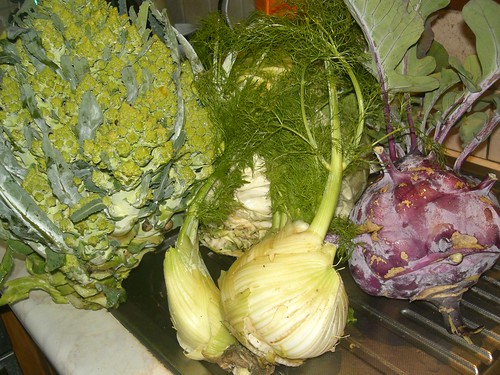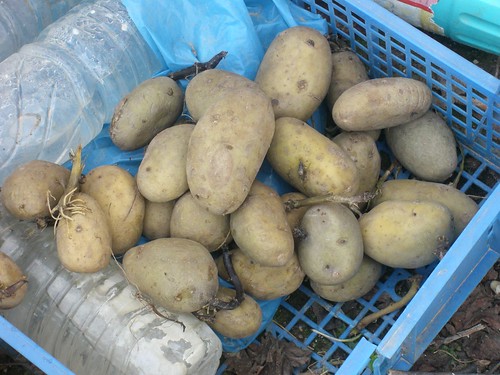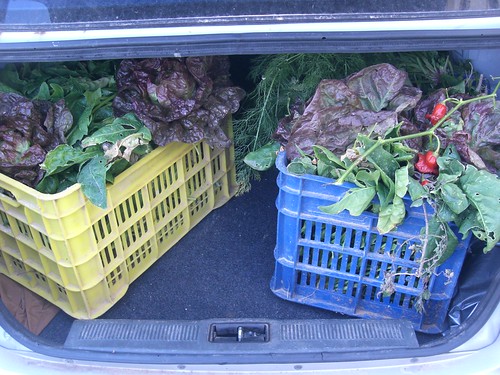I'm now down to counting the days before I get to the Ministry of Food exhibition. On the opening night of the exhibition, one of the invited guests, a VIP in the older age group, recalled eating a lot of potatoes during the period when food rationing was enforced in Britain, during the second world war.
Have you ever seen the potato plant? From the soil to the table...
"Digging for victory? Never 'eard of it," said my uncle, when I told him about the little trip we were going to take, and what we intended to do when we went there. "We dug to eat, not to conquer; still do, in fact." Even now, he continues to dig, because that's what he's done most of his life, and old habits die hard. As a retired senior citizen, Uncle can enjoy his hobby full time, but this work was never just a hobby. After a few years working in New Zealand, he returned to the village, bought a pick-up truck and set up a business with his brother. They ran the village μπακαλομανάβικο (bakalomanaviko - a combination of μπακάλι 'grocer' and μανάβι 'greengrocer') for two decades "until everyone started going to the supermarket and no one bought anything from the small shops any more," he tells me. They sold everything a typical village shop sold with one difference - they did not buy everything from wholesalers: they grew large quantities of fresh produce on their own land and sold it. You cannot get more local. These small shops still exist in the village, but in a new form: they are more likely to sell sweets, savoury snacks and newspapers rather than fresh produce.
Uncle enjoys his greens more than anything else. He never sits down to eat without a salad. If he is too busy to cook a meal - like during the olive picking season - then a salad will constitute the main meal of the day. "They're not to everyone's liking, but I've always liked my greens," he proudly admits, "and they're not always green," he reminded me. In the summer, he grows row upon row of tomatoes, while in the winter, there are lots of potato patches. Everything is used in some way: it may be eaten, preserved, frozen, or fed to the chickens, rabbit and sheep that he keeps on the farm - yes, even animals want their fresh veggies! A small quantity of what he grows is also sold to the small shops in the area for further selling to consumers when there is demand. But a lot of what Uncle grows is for his own home. He doesn't mind if it doesn't all get eaten - this is his hobby.
His growing interests have developed to a different level from what he used to grow for his business and personal needs. Now he grows things that aren't known or ever grown or even sold in the local shops: finnochio (fennel bulb) is imported from Italy, while kohlrabi and brocoflower (calabrese) are never even seen on the market. If he wasn't growing them, I would never have seen or tasted these vegetables myself, especially in the Mediterranean island where I live where these vegetables are still considered very exotic. Some of his starter plants and seeds are bought (like potatos), but he also saves seeds from one year to the next; some of his seeds have been used in the family for the last thirty years, as heirloom varieties. He is also given seeds by friends who have travelled and bring back seed with them for their own gardens.
He grows a variety of chili peppers, but he doesn't use them himself. "They're very pretty to look at, those pepper plants, with their different shapes and colours and sizes." The only flowers he keeps are some some rose bushes by the path leading to the entrance to the house, but that's mainly for sentimental reasons - his mother had planted them fifty years ago. Aside from the plants, there are also a few chickens and rabbits, and a couple of sheep for the family meat. Thirty years ago, he kept sheep and goats for milking and making curd cheese; he doesn't do this any more, because it's not easy to maintain animals in what was once a rural area which is now becoming increasingly more urban, making it difficult to find grazing ground.
I spotted a small crate on the ground filled with what looked like baby potatoes. "Are these for animal feed, Uncle?" The potatoes looked small and dark, with hairy roots sprouting out of them.
"Oh, they're not for eating, those ones, they're potato seed," he explained, "these are μάνες (literally 'mothers'), from Holland, a good variety, it's always important to plant a good variety of potatoes," he advises me, "for a good crop and a large yield."
Just across from the crate, near the water tap where the soil is separated from the cemented yard lay some tired looking stalky fronds. Into this small patch of ground, measuring no more than two-by-two meters, he had buried into the earth some of last season's golf-ball sized potato crops, "just for a laugh," he joked, "to see what would sprout out of them." Whenever he feels like some french fries, he digs up a few for a meal.
Just digging...
"Shall we fry some up now, for the young 'uns?"
"Yes," I said, "and for the older ones, too." There can't be many people who don't like freshly prepared french fries, made from real potato, and cooked in olive oil. He dug up a few of the potatoes - "don't use the μάνα, and always look out for rotten one!" - washed them in a bucket by the tap, scraped the skin off - "that's what fresh potatoes are like, you don't need to peel them" - and cut them into chips using a potato chip cutter. Must get one of those, I thought.
During this time, the children had been having the time of their lives: chasing chickens in the coop, collecting bits of stones and sticks in the garden: burying olive pips in the earth and then watering them by filling up water bottle: "they're going to grow into a tree, aren't they, Mum?" They were now hungry. We moved into the kitchen, where Uncle had just set a pan with olive oil on the gas cooker.
"Open the fridge," he beckoned to them as he poured the chips into the pan. "Take out the cheese, oh, and would you like to try some good feta?" He brought out a loaf of bread and sliced it, then he found some walnuts in a jar and put a few on a plate. There were some rusks and a plate of olives already on the table. He poured some olive oil over a slice of feta cheese. "Want some wine to go with that?" he asked them jokingly.
From the farm to the table (and then some)...
Uncle was a war baby; he was only a few months old in the year of the Battle of Crete. Although he did not live through the roughest years of the period of time that was marked in Athens by the Greek famine, life for him as a young schoolchild was never a picnic. Living in a mountainous village for the first two decades of his life, he has always been used to hard work. The good thing now is that, although hard work is still needed, there are many good tools and equipment available to make life easier. He told me that the garden will be ploughed soon (by machine) in preparation for the summer garden.
"If you want to pick some spinach, there's plenty for the taking, it's only going to get mulched next week," he informed me. So off I went into the garden and picked not just spinach, but a fennel bulb to cook with cuttlefish, some celery for bean stew, red lettuce for a salad, chili peppers for a more adventurous (and admittedly slightly off the Mediterranean track) meal, and finally a bag full of lemons from the tree. Luckily I had two crates in the boot ready to receive my stash.
When I had finished my harvesting, the chips were done and the children were eating. "These ones taste better than the ones we make at home, Mum." I wonder why...
"If you want to pick some spinach, there's plenty for the taking, it's only going to get mulched next week," he informed me. So off I went into the garden and picked not just spinach, but a fennel bulb to cook with cuttlefish, some celery for bean stew, red lettuce for a salad, chili peppers for a more adventurous (and admittedly slightly off the Mediterranean track) meal, and finally a bag full of lemons from the tree. Luckily I had two crates in the boot ready to receive my stash.
When I had finished my harvesting, the chips were done and the children were eating. "These ones taste better than the ones we make at home, Mum." I wonder why...
©All Rights Reserved/Organically cooked. No part of this blog may be reproduced and/or copied by any means without prior consent from Maria Verivaki.





Fries never looked better (I imagine tasted better too)!
ReplyDeleteHow wonderful to has this keen produce gardener of an Uncle in your life. His vegetables look so fresh and lush, and the fries ........ Yum!
ReplyDeleteI'm was thinking of making fries this week and now I have to. I loved reading this. How nice that your uncle has his own potatoes.
ReplyDeletePerfectly fried potatoes are one of the yummiest things on earth!
ReplyDeleteOne of many things I remember about Greece was fries at every meal. They sure know how to fry them to perfection.
ReplyDeleteWhat a magnificent harvest! Fresh potatoes are so lovely and firm. It's great that even the reject potatoes have made such a good crop for your uncle.
ReplyDeletePatates tiganites are the best! Still to this day my mother makes the best batch (when I see her and request it). The Greeks def have this down to a fine art!
ReplyDeleteWe've dug over our kypos and started planting the seedlings..the potatoes are in already...We're still eating leeks and cabbage from our garden and of course the parsley and papoules are wonderful still..I love it!! especially now we have fresh eggs every day too!
ReplyDeleteI am looking forward to the Ministry of Food Exhibition too. When are you going? My mother carried on eating bread and dripping, one of her childhood wartime meals, for the rest of her life. She also ate potatoes every which way, even mashed potato sandwiches. And she made a mean meat and potato pie, complete with little ceramic blackbird holding up the pastry crust. She didn't have a sweet tooth at all.
ReplyDeletei dont have a sweet tooth at all, but every now and then, say about every 15 days, my body seems to drive the message into my brain that a sweet (a chocolate, a pastry, something with sugar) would be nice - we will probably be at the IWM on the ides of march but i'm not sure about the time
ReplyDelete